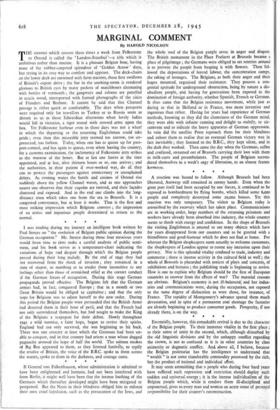* * * *
A reaction was bound to follow. Although Brussels had been liberated, Antwerp still remained in enemy hands. Even when the great port itself had been occupied by our forces, it continued to be exposed to bombardment by flying bombs, which killed some 6,000 people and completely destroyed some 20,000 houses. Yet this reaction was only temporary. The visitor to Belgium today is astonished by the recovery which has taken place. Communications are in working order, large numbers of the returning prisoners and workers have already been absorbed into industry, the whole country seems to throb with energy and confidence. In the shops of Brussels the visiting Englishman is amazed to see many objects which have for years disappeared from our counters and to be greeted with a friendliness and good-humour which he does not find at home. For whereas the Belgian shopkeepers seem actually to welcome customers, the shopkeepers of London appear to resent any intrusion upon their privacy. Nor is this splendid vitality confined to trade, industry and commerce ; there is intense activity in the cultural field as well ; the whole of Brussels is placarded with notices of plays and concerts, of exhibitions and lectures ; the publishing trade is beginning to revive. How is one to explain why Belgium should be the first of European countries to recover from the effects of war? The material reasons are obvious. Belgium's economy is not ill-balanced; and her indus- tries and communications were, during the occupation, not exposed to the same degree of dislocation as were those, for instance, of France. The rapidity of Montgomery's advance spared them much devastation, and in spite of a permanent coal shortage the factories are already beginning to produce consumer goods. Prosperity, if not already there, is on the way.
* * * *






























 Previous page
Previous page